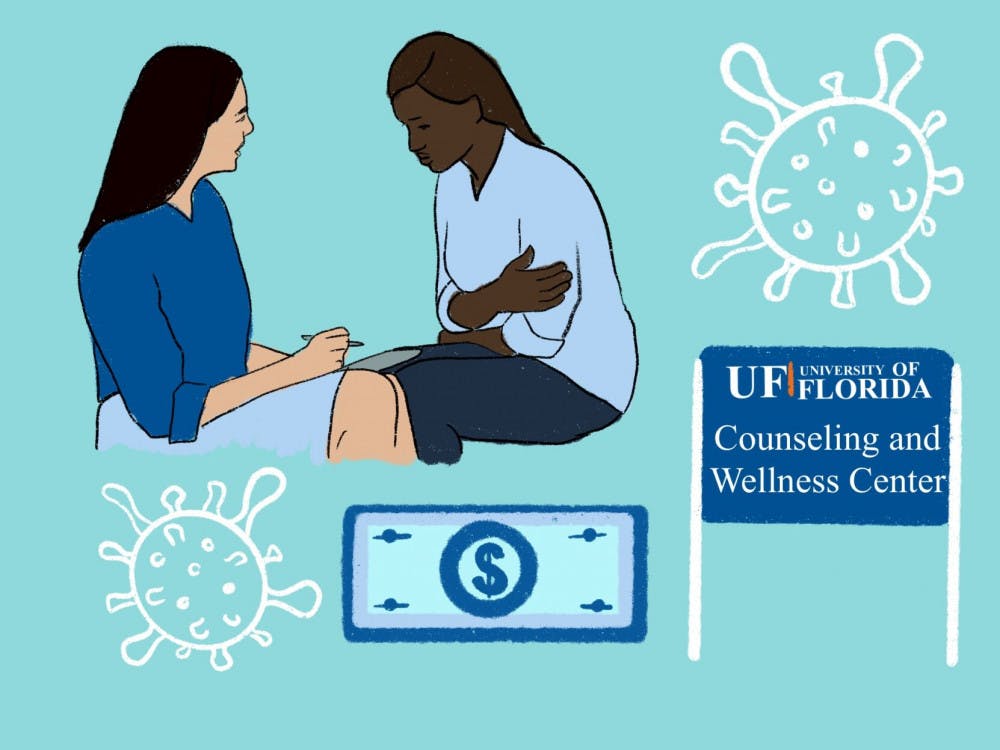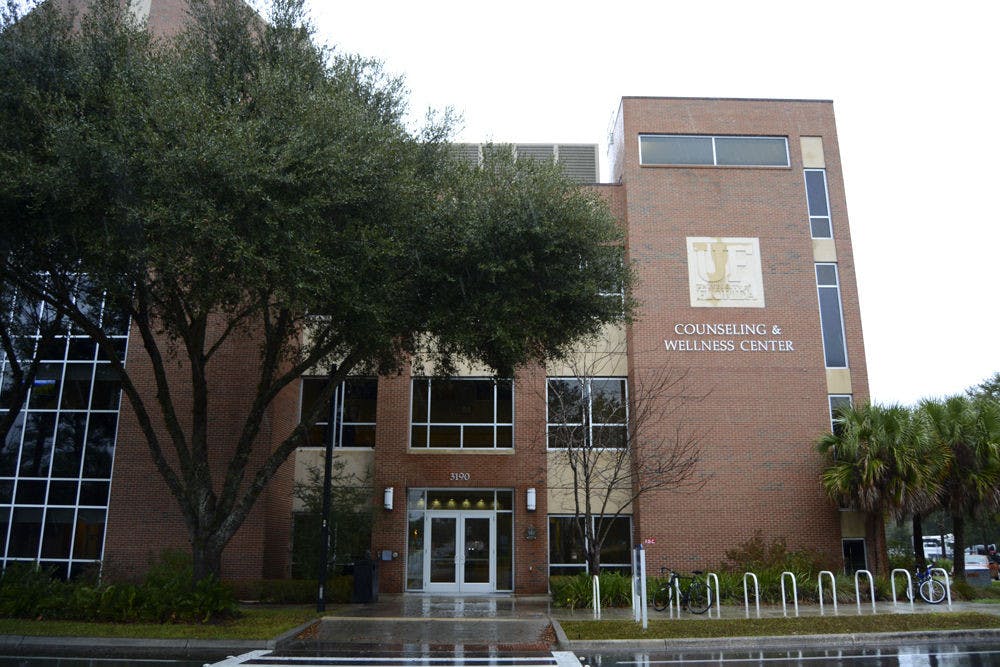
Editor’s note: This article contains a reference to suicidal thoughts. Students were granted anonymity for reasons including the sensitivity of the topic and their ongoing interactions with the CWC.
“U Matter, We Care” is the slogan adopted by UF’s Counseling & Wellness Center. It feels like an empty gesture to some students who have sought out the center’s services.
Students’ experiences vary, with accounts of long wait times, feelings of being brushed off by CWC counselors and a lack of transparency about UF’s available resources. The CWC director said he feels confident in the center’s ability to help students but cites its tight budget as an obstacle — one that it is starting to overcome.
Despite a larger staff than previous semesters, shorter wait times and an increase in state funding, CWC appointment numbers have plateaued after a previously steady increase since 2016.
The center has conducted 8,891 appointments through the week of Nov. 2 this semester. This is a decrease of 1% from the same 10-week mark in Fall 2019, CWC director Ernesto Escoto said.
This number of student clients fell from 5,800 students in the 2018-19 year to 5,395 in 2019-20, a decrease of 7%.
The COVID-19 pandemic created more obstacles for the center in the Spring. The CWC closed after classes went online in early March. Students said they either continued counseling virtually, were dropped by their counselor or gave up on getting one.
The center trained employees in tele-mental health counseling, which relies on connecting virtually with patients and reopened in a new online format in two and a half weeks.
Escoto said program directors began researching virtual counseling alternatives, setting up technology and training staff to jumpstart their tele-mental health services as soon as UF moved online. The center dipped into its savings to pay for these unforeseen expenses.
He expects that remote CWC services are not just a temporary solution to the challenges of the pandemic.
“We're kind of surprised that it actually works,” Escoto said. “It's been pretty effective in a lot of spaces. And so, there is no reason for us to go back to fully providing everything in person.”
He said he expects to see a hybrid option developed, when it is safe to do so in light of the pandemic, with the hope it provides better flexibility for students.
After being on the waitlist for two weeks, a 19-year-old UF astrophysics sophomore said she saw a CWC counselor for four months before the pandemic hit. It was then that she said her counselor informed her that she couldn’t see her anymore because campus was shutting down due to increasing COVID-19 cases.
“I never heard from her again,” the student said.
She didn’t receive any follow-ups from the CWC about telehealth visits, which would begin two and a half weeks after UF moved online.
She visited the CWC during Fall 2019. She said she had severe depression and anxiety symptoms that kept her in bed some days.
One day, when she had enough energy, she said she met with a CWC counselor for a crisis walk-in, where students in need of immediate support can speak with a counselor.
“She basically told me ‘Your problems seem way too complex for us to address here,’” the student said.
She said she was given the local and national suicide hotline numbers and sent on her way.
She later discovered the Instructor Notification process, which informs professors about an emergency a student is dealing with; medical withdrawal, which allows students to withdraw from classes due to a health emergency; and Disability Resource Center accomodations.
The student said she returned to the CWC a month later after beginning the medical drop process for Spring 2020. She found the counselor who she had briefly met with to ask for a letter.
She said the counselor realized then how severe her problems were and offered to put her on a waiting list to see someone weekly at the CWC.
“Well, you could have done that when I told you I wanted to kill myself,” the student said.
CWC director Escoto said he suspects more students were lost in the shuffle when moving to online counseling. He encouraged students who were disconnected from CWC services to call the center and ask to be reconnected.
The center operates on fees charged to on-campus students. PaCE and online students can choose to opt in to the fees.
Escoto called the center’s health fee funding unpredictable – he doesn’t know what the budget will look like for the next semester until a few weeks into the current one.
Drop/add week also makes an impact. Credit hours could be higher at the beginning of the semester and decrease as the semester continues, decreasing the center’s potential budget.
Escoto says this funding has not increased per student in the five years he has been director.
The proposed 2020-21 budget is projected at about $7.5 million, Escoto said.
The center is still waiting to see what UF decides to do in the Spring before resuming in-person counseling options, he said.UF plans to offer at least as many in-person class sections in the Spring as were offered in Spring 2020.
A 20-year-old UF finance junior waited a month to see someone at the CWC. She had been suffering from frequent panic attacks, sometimes many times per day.
The student said she was told by a counselor to download a breathing app on her phone. No follow-up appointment was scheduled. The student was told the CWC could not help her, as her treatment would require more than the six counseling sessions it could offer at the time.
“There are good resources there,” she said. “I just think that there's not enough, and sometimes, it doesn't match the severity of the issue.”
She was referred to another mental health professional in Gainesville by the center.
In the meantime, she attended group therapy sessions provided by the CWC, which she said was a helpful part-time solution.
Escoto said this referral process is a standard operating procedure for the CWC.
“There might be some experiences or conditions that we may not have somebody in our team qualified to provide care for,” Escoto said.
CWC assistant director Rosa West, who oversees the center’s outreach efforts, is aware of criticism the CWC has received from students.
The most recent outreach push was aimed at Reddit, a site that hosts forums for a variety of topics, including one dedicated to UF student life. The center hosted an “Ask Me Anything,” on Oct. 19 that focused on improving the CWC’s relationship with students, West said.
She said the event’s announcement was met with backlash, but there were no negative comments during the Q&A session.
West said she wanted to inform students of the changes the center has made, especially its reduced wait times and that most poor experiences with the center date back one or two years.
“What they may have experienced is not necessarily what our center looks like today,” West said.
In response to long wait times, Escoto said only about 6% of the 5,800 students who reached out to the CWC during the 2018-19 year were waitlisted for two weeks on average.
“In the context of the academic experience of a student, two weeks feels like a lot of time to wait for an appointment,” he said.
Escoto said he has been asked by UF to prepare for a state budget cut between 10% and 20%, about $1.3 million.
The center is in the midst of what Escoto calls a “hiring freeze,” which is why these positions remain unfilled.
An 18-year-old UF nursing sophomore said she visited the CWC last Spring semester. She told the counselor she experienced anxiety.
She said the CWC was unable to provide regular, one-on-one meetings with a counselor.
Instead, she was offered sessions with a different case manager each week. After two or three sessions she said she became frustrated and stopped going back.
“They were trying to help me, but it was clear that they didn't know how to,” she said.

Budget allocation for staff salaries has steadily increased. The CWC received an additional $800,000 in state funding over the past three years through the UF Provost Office, which was spent on 12 new counselors.
The center added 10 new counselors this year for a consultation and assessment referral team, totaling more than 20 new hires in three years, Escoto said. The funding to create this new team was from money carried over from previous years’ budgets.
These positions funded by the provost have been guaranteed for the next two years, but Escoto said he hopes to secure more funding from UF to permanently support these salaries.
The center’s grant money has disappeared in recent years. Escoto said that after grants expired in the 2015-16 fiscal year, the CWC did not allocate resources – both time and money – to applying for more grants.
He said most grants are research-based, but the center provides a service. Searching for grants applicable to the CWC would require a position dedicated to just this cause. Escoto sees this as resources that could be spent counseling students.
“It would really work against the mission,” he said.
A 21-year-old UF electrical engineering junior scheduled a triage appointment, where a counselor conducts a benchmark session with a new patient in order to create a treatment plan, during Fall 2019 at the CWC. She found herself spacing out, whether it be during school work or talking to friends and wanted to see whether her symptoms needed treatment.
The CWC employee told her that her classes may just be too difficult and referred her to a UF study tip workshop at the Reitz Union.
“She basically said, ‘Oh, well it's highly unlikely that you would have this if you made it to UF,’ as if somebody couldn't make it to UF if they have mental issues,” the student said.
The junior said she feels as if UF, and what she called its negligence of the service, is where the real problems lie.
“Even though they say we care about your mental health, or your health in general, half the time it really does not seem that way,” the student said.
She said the counselor accused her of looking for a drug prescription.
Escoto said the CWC does not prescribe drugs to students, but counselors make referrals to UF Psychiatry services, located in the Student Health Care Center on Radio Road.
Dr. Kishan Nallapula, the head of UF tele-mental health treatment, said if a student is requesting medical treatment they should see a counselor who is able to refer them to the appropriate resource.
“It's not like just because somebody is asking for medicine that they don't get it,” he said.
A 19-year-old UF psychology and English sophomore also made an appointment at the CWC in Spring 2020, after returning from Winter Break and having trouble readjusting to college.
She said there was only one therapist available and the weekly appointment conflicted with her class schedule. She said she was not offered to be put on a waitlist for individual sessions but was offered CWC group therapy and given papers to fill out to find a therapist in Gainesville.
She said she felt overwhelmed by this and decided it wasn’t worth it. She found a therapist online during the summer and said it worked out.
“I haven’t yet met anyone that has had a good experience with the CWC,” she said. “I don’t trust them both because of the experience I had early this year and because I feel that they have not accomplished their goal of spreading mental health awareness across the UF campus.”





